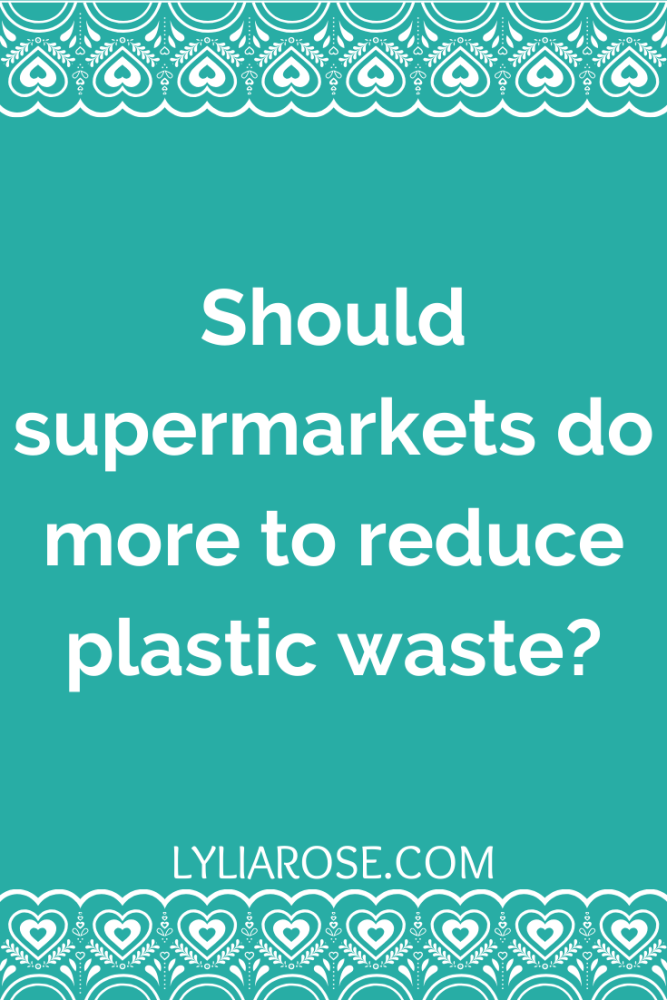Do supermarkets need to do more to reduce their single use plastic waste?
Posted on
There seems to be a huge focus on consumers making the right choices at the moment when it comes to being eco-friendly, but I really think the responsibility needs to lie more with businesses, manufacturers and the governments. After all, they have the power to create more eco-friendly products and enforce it.
It always maddens me to still see non-recyclable packaging and plastics used time and time again for products. It’s 2020 for crying out loud! Single-use packaging, especially, that cannot be recycled should be banned.
Do supermarkets need to do more to reduce their single use plastic waste? Let's explore.

How supermarkets are starting to reduce single-use plastics
It should have been banned a long time ago. It’s great to see that Tesco are removing multipacks of tins that are wrapped in plastic from their shelves. Instead they will sell single tins and offer multi-buy deals instead.
This is a great way to reduce so much unnecessary and non-recyclable plastic waste from essential food items that families buy every single week. It’s a great move and I hope other supermarkets will take note and do the same. There is so much plastic-packaging on items in the supermarket and it's pretty much the only stuff we put in our landfill bin nowadays. It would be amazing to see it removed completely and we'd barely need a landfill bin at all!
The Mid-Counties Co-operative have also promised to replace all single-use plastics and coffee cups with re-usable and environmentally friendly alternatives in 2020 as part of their 1Change campaign to reduce single-use plastics.
Sainsbury’s have removed single plastic use bags from their fresh fruit and vegetable aisles and replaced them with a reusable 30p drawstring bag made from plastic bottles. Or customers can choose to bring in their own containers.
This is the change that needs to happen but it needs to start happening quicker!
The thing is, consumers will adapt to it, or rather they’ll have to adapt to it, if it’s the only option provided by supermarkets.
We all need to eat and we cannot always afford to choose what our food comes in. Cereal is a big bug bear of mine! It’s possible to create compostable inner cereal bags now, but I’ve only seen this once in a very expensive natural health shop’s cereal.
Most people can’t afford to feed their kids this expensive cereal, so they have to buy cereal in non-recyclable packaging… and then are made to feel guilty about it.
It’s not right and the companies should be the ones feeling guilty, being fined for creating so much unnecessary waste when there are alternative solutions and being forced to use the more eco-friendly solutions that are already available.
There are so many eco-friendly and recyclable packaging options nowadays, there’s no excuse for a business to not use them. Ideally all food products can come in compostable and natural materials, but that is definitely a very idealistic viewpoint!
Plastic is definitely here to stay as it’s such a huge part of our lives, so at the very least companies need to ensure their products come in recyclable plastic. It’s really not that hard. There are plastic bottle suppliers whose products are always recyclable, created from as much recycled material as possible and are members of the charity Recoup who aim to make the manufacturing and waste management of plastic a sustainable operation.
It’s about businesses being responsible with the type of packaging they are sourcing and who they are sourcing them from. The supermarkets can take a stand by refusing to buy non-recyclable plastic products from companies and need to set standards for the type of packaging they will allow on their shelves. And they should make this stand. Now.
Are supermarkets acting quick enough and helping to prevent this unneccessary plastic waste? Are they doing enough? I think they could do more.
Hopefully one day every shop will offer affordable refillable solutions for all our favourite products and essentials. But I think that day is a long way off.
Related blog posts
Lil Packaging goes eco-friendly with their ecommerce packaging range
Save money + be eco-friendly with these sustainable packaging options
Cut the wrap, save money and stop using single use wrapping paper
Be eco-friendly with a climate-conscious pension from PensionBee
How cutting back on plastic benefits your life and saves money
How to cut household expenses with renewable energy
3 eco-friendly subscription boxes I use and love
